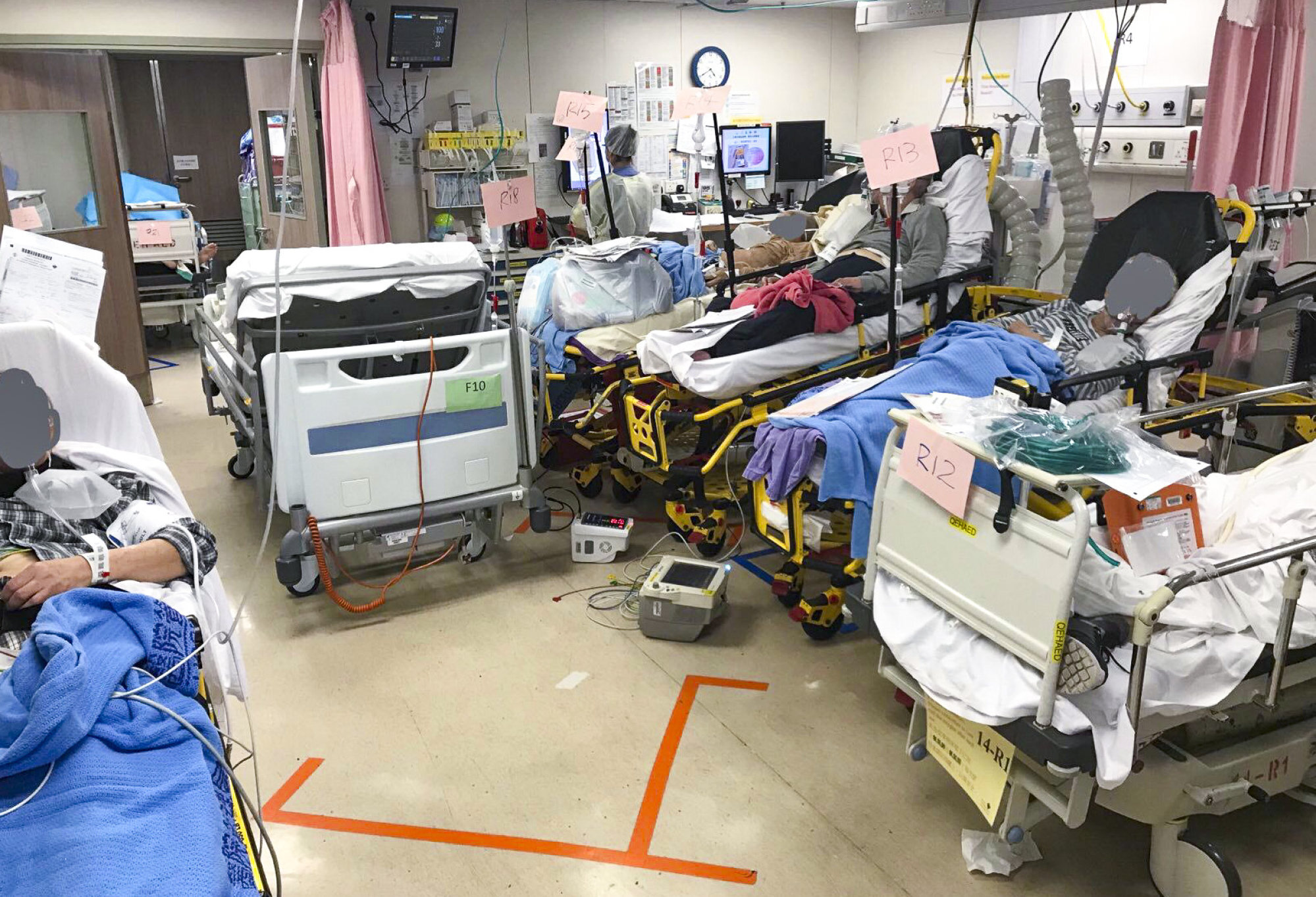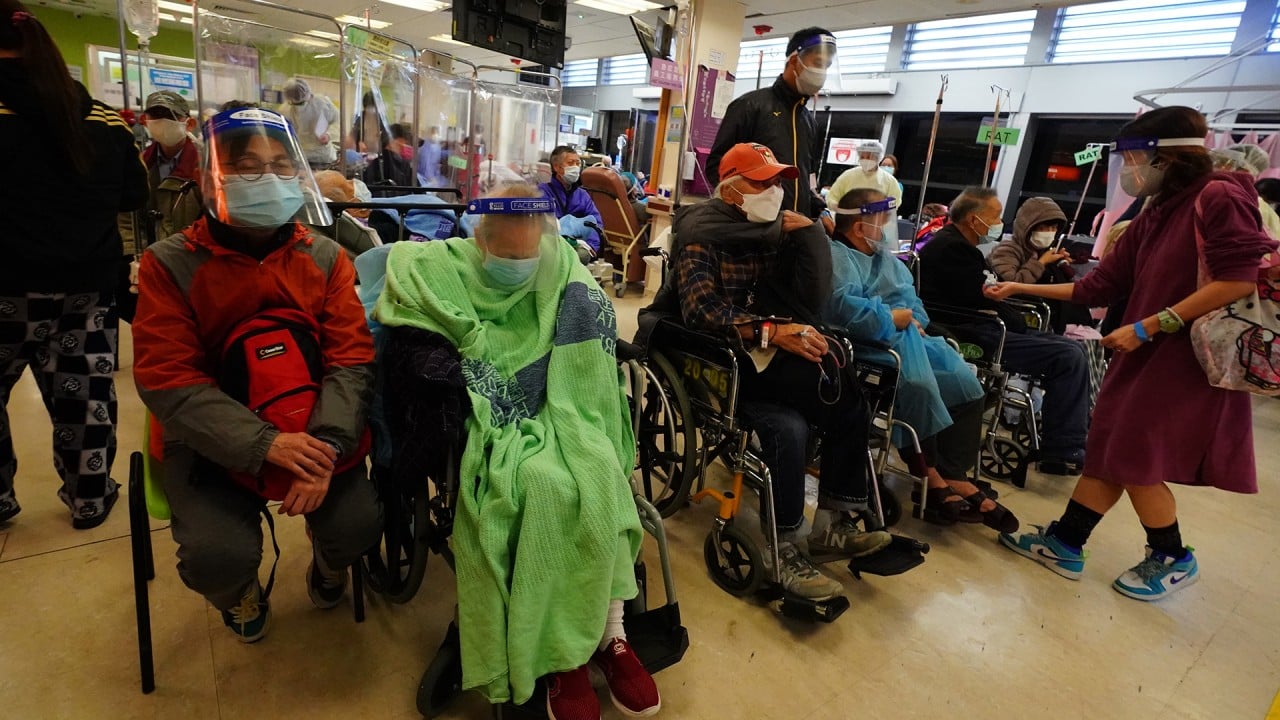
Coronavirus: Hong Kong medical workers share distressing scenes from overcrowded public hospitals as cases surge
- Supply of oxygen cylinders has been affected by large case numbers, with medical workers forced to check each cylinder to avoid patients needing resuscitation
- Limited space has created poor hygiene conditions, with one medic saying an emergency department smelt of human waste
Crowds of critically ill patients, low oxygen supplies and poor hygienic conditions were among scenes reported by some public health care staff as Hong Kong struggles with its worst coronavirus outbreak to date.
The Post talked to health care workers who shared their distressing experiences at public hospitals amid the fifth wave, along with their frustrations at being unable to provide proper care to so many patients.
In the accident and emergency department at Queen Elizabeth Hospital in Jordan, the situation has begun to feel like a battlefield, according to several medical workers.
Hong Kong prisons report 1,000 coronavirus cases among inmates
One doctor, who spoke on the condition of anonymity, said about a dozen critically ill patients, admitted earlier in the week, had been stuck in a resuscitation room for periods ranging from 16 to 24 hours before being transferred to other wards.
Several patients have been relying on ventilators to pump air into their lungs, while the rest have required large amounts of oxygen.
Dwindling oxygen supplies have become an issue as an increasing number of patients need help with their breathing, the doctor said.
“We are running out of oxygen,” he said. “We have plenty of patients on oxygen [support] using just an oxygen cylinder under their beds.”
But monitoring the oxygen levels of each cylinder has proven difficult, as there were no devices to warn medical workers when they needed to be replaced.
“There had been some patients who ran out of oxygen and had a cardiac arrest and required resuscitation,” said Winnie*, a nurse from the same department. “I think it is negligence, but now we are in the middle of a crisis and we are left with limited options.”
She said the current situation had forced staff to manually check the cylinders one by one every few hours to prevent patients from running out of oxygen.
Other patients have been receiving oxygen from wall outlets connected to the hospital’s central supply.
But Winnie said that while patients hooked to the outlets did not need to have any cylinders replaced every few hours, there was a risk of cross-infection as they shared supplies intended for one person between three to four people.
Each patient sharing an outlet might also struggle to receive a sufficient supply of oxygen, she added.
Dr Larry Lee Lap-yip, a chief manager of the Hospital Authority, said on Thursday there had been a growing demand for oxygen and the overall supply was sufficient.
But he admitted that there was an issue with the turnover arrangements for cylinders.
“Sometimes there are some problems with the flow of oxygen cylinders. We are now handling the issue,” Lee said.
Despite media outlets reporting scenes of overcrowding at public hospitals for several weeks, medical workers have said the situation has shown little signs of improvement, with patients at the emergency department in Queen Elizabeth Hospital lying in ambulance stretchers due to a lack of beds.
“Those [stretchers] belonged to ambulances but not the Hospital Authority. They were used for transporting patients,” the doctor said. “But we took them and refused to return them, as we really have no beds left.”
Hong Kong confirms record 56,827 cases; ‘500 testing centres planned’ for universal screening
Hospital beds and stretchers have been squeezed into every available space, with vital signs monitors for some patients placed on floors due to a lack of space for stands and tables.
The lack of space has also made it difficult to maintain hygiene levels among patients.
“Every time I help change the diapers of those patients, I need to move other beds in order to get to the bedside,” Winnie said. “The floor is very dirty as it is hard to clean [the congested space].”
With a large number of elderly patients needing to use bedpan or diapers, the emergency department had begun to smell of human waste, she said.
As of Tuesday morning, more than 520 Covid-19 patients were admitted to the hospital, while 350 others were still waiting in the emergency department.
The doctor who spoke to the Post said it was impossible to check on every patient in a timely manner.

“We can’t monitor and feed everyone,” he said, adding that an elderly patient had to be resuscitated after they were found unconscious and had low blood sugar levels.
“God knows how long he had been starved,” the source said. “He was probably too weak to complain he was hungry.”
In a non-Covid geriatric ward at Tuen Mun Hospital, patient care assistant Au, who asked to be identified only by her surname, said her current workload was similar to that of the past four waves of the coronavirus outbreak.
But with the sharp rise in Covid-19 cases across Hong Kong, she said that even her ward needed to conduct swabs to identify any potential infections among patients.
Lacking the negative-pressure facilities of designated Covid-wards, Au said there was only a plastic partition separating coronavirus cases from uninfected patients.
“Our stress is immense,” she said. “We don’t know if a patient admitted to our ward has been infected … I was worried that I would get Covid-19 and infect my family members.”
*Name changed at interviewee’s request



